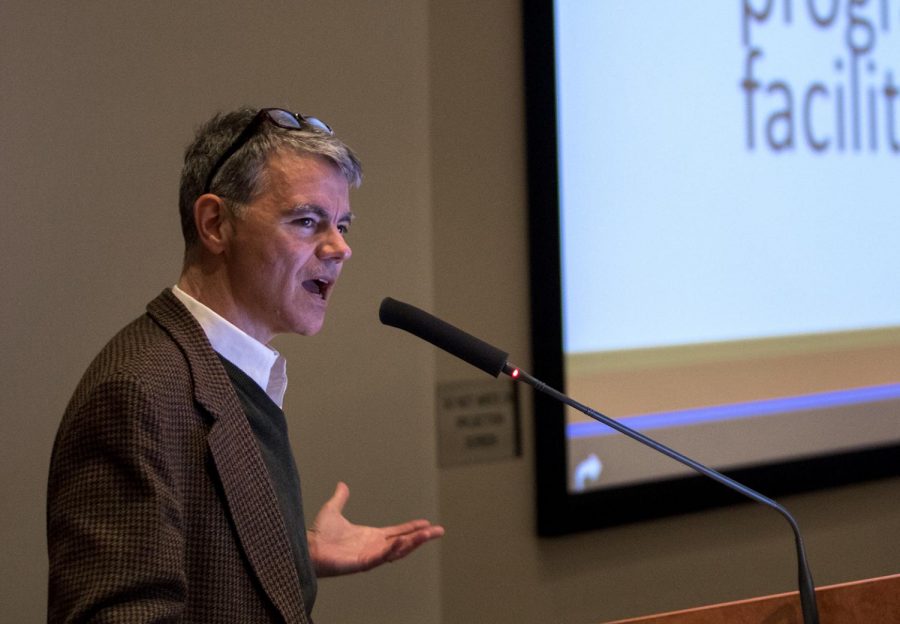Strategic planning committee seeks to increase diversity
February 14, 2018
One of the committees in WKU’s Strategic Planning Process has set several five- and 10-year targets to increase diversity on campus.
The diversity, equity and inclusion committee set three goals, each of which have several target objectives presented today during the second of two open forums. The first forum was held yesterday.
They include increasing faculty and staff diversity by 15 and 30 percent in the next five and 10 years, respectively; increasing student diversity by 20 and 40 percent in the next five and 10 years, respectively; and completely eliminating the barriers to the success of diverse populations at WKU in the next five years.
Committee co-chair Molly Kerby said diversity on WKU’s campus is something that can be improved.
“We can do a much better job on this campus in recruiting and retaining diverse populations,” Kerby said.
Two other targets involve decreasing both incidences of conscious and unconscious bias and intolerant behavior targeting faculty, staff and students by 75 and 100 percent in the next five and 10 years, respectively. The final target seeks to increase diversity in WKU leadership by 25 percent in five years and 50 percent in 10 years.
Kerby’s co-chair Lynn Holland said the committee’s plan is ambitious, but that was intentional and what the committee was instructed to do.
“[The plan is] also to provoke conversation and thought,” Holland said.
Two audience members asked that other forms of diversity, such as gender identity and sexuality, be included in any diversity training faculty and staff may be required to undergo. Kerby said the plan is to focus on both of those as well as other forms of diversity such as disabilities.
The open forum also included presentations from the other committees.
Rob Hale, co-chair of the academic innovation and excellence committee, said the committee’s two goals include creating an academic environment that encourages “excellence in faculty teaching and student learning” and enhancing and creating systems to help teaching and improve learning.
Christian Ryan, one of the chairs of the budget, efficiency and infrastructure committee, said the committee decided to define “budget” as fiscal stewardship which can mean “responsibly using resources entrusted by the university” to the WKU community. Two parts of the committee’s mission are to use resources wisely and foster transparency and collaboration.
Kelly Madole, co-chair of the research, scholarship and creative endeavors committee, said her committee wants to expand research and scholarship opportunities for graduate and undergraduate students.
The goal of expanding research is something President Timothy Caboni has expressed several times since starting at WKU. On several occasions, he has said he wants to further develop WKU as a “student centered, applied research university.”
Caboni has also said he wants to reevaluate admission processes to ensure every student who is admitted to WKU is able to succeed in college. He has also talked about the need to increase enrollment, which has been declining.
Jerry Daday, co-chair of the student success and experience committee, expressed similar sentiments when discussing the committee’s goals. The two goals include focusing on student retention and degree completion and preparing all students for success before and after graduation.
Michael Simpson, chair of the College Heights Foundation, concluded the forum with an update on the external relations and alumni engagement committee. Simpson said the committee hopes to develop a stronger relationship between the different WKU-related foundations such as the College Heights Foundation and the Hilltopper Athletic Foundation.
Simpson said it is also important to reach out to the WKU community beyond Bowling Green and Warren County. He said WKU has heavily relied on the local businesses and alumni, and there “may be a sense of fatigue” from WKU’s reliance on the surrounding area.
Simpson said there have also been discussions about creating a pre-alumni association.
This was the second open forum in two days. The first meeting on Monday was held in Ogden College Hall. Anyone interested in learning more about the committees’ progress or submitting input can visit the WKU Strategic Plan webpage.
News reporter Emma Collins can be reached at 270-745-6011 and [email protected]. Follow Emma on Twitter at @_mccain_emma_.


























